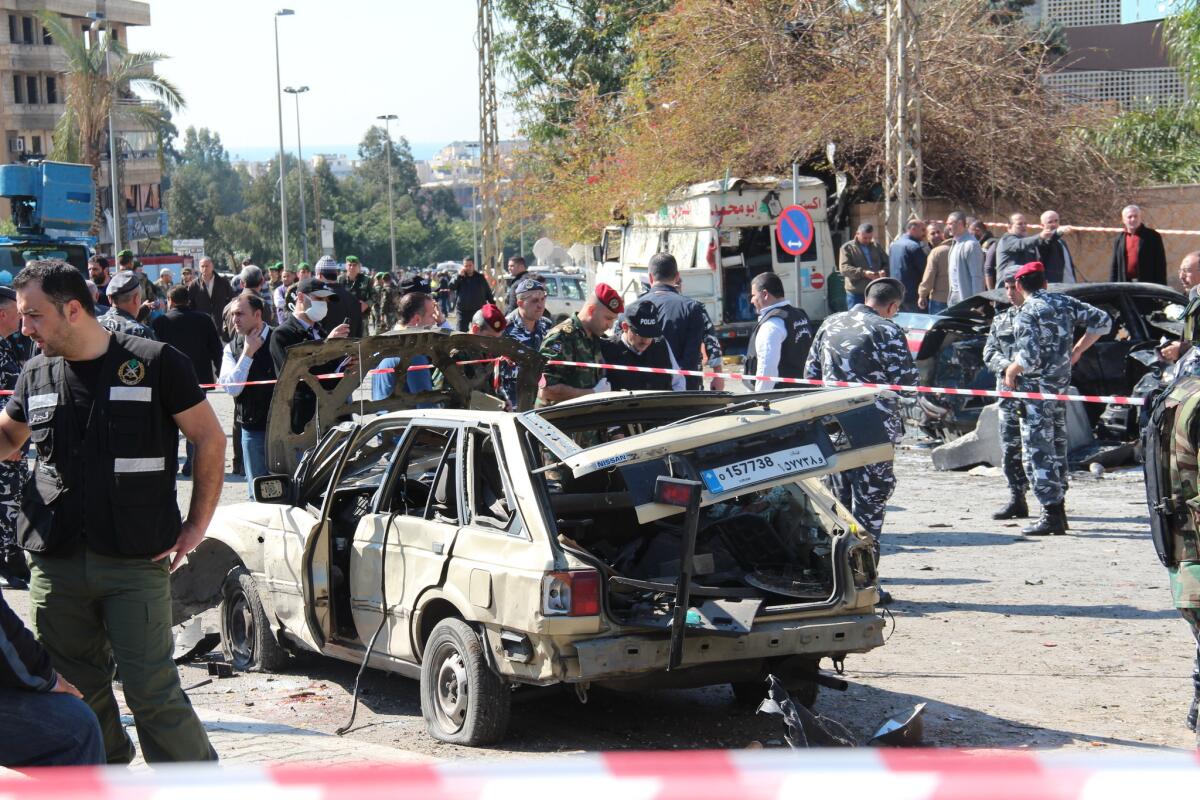Twin suicide car bombs strike Lebanon’s capital, kill at least six

- Share via
BEIRUT -- Twin suicide car bombs ripped through a residential district of the Lebanese capital Wednesday in the latest deadly attack believed tied to the war raging in neighboring Syria, according to official and witness accounts.
At least three people were killed and scores injured in the blasts, which may have targeted a nearby Iranian cultural center.
[Updated at 8:35 a.m. on Feb. 19: Lebanon’s official news service later raised the death toll to at least six and said 129 people were injured, including four victims who remained in critical condition late Wednesday.
Lebanese politicians from a broad spectrum of political parties condemned the attacks, saying they were a deliberate effort to incite sectarian strife and undermine Lebanon’s fragile democracy.]
The strikes -- the latest in an escalating series of bombings in Lebanon -- occurred during the morning rush hour near a busy traffic circle in the densely populated Bir Hassan neighborhood.
The near simultaneous blasts were both the result of suicide attackers in explosive-rigged cars, a BMW and a Mercedes, the Lebanese army said.
Witnesses described a scene of chaos as lethal shrapnel flew in the air, fires raged and body parts were scattered about the streets.
“I was driving in my car when suddenly I heard this huge blast,” recalled Ahmad Lutayf, who said he was almost impaled by a windshield wiper blasted from his vehicle. “I can’t believe I got out in one piece.”
The nearby Iranian cultural center may have been the target, according to initial reports. One bomb detonated about 165 feet from the facility, while the other exploded near an orphanage.
Iran is a major ally of the government of Syrian President Bashar Assad.
Last November, twin suicide car bombers targeted the Iranian Embassy in Beirut, killing almost two dozen people, including an Iranian cultural attache, and injuring more than 100.
In Tehran, the official media reported that no Iranian diplomats were killed in Wednesday’s blasts.
An Al Qaeda-linked group, the Abdullah Azzam Brigades, took responsibility for Wednesday’s attack in a message posted on its Twitter account. The same group said it was behind last year’s strike outside the Iranian Embassy.
At the chaotic bomb site, scenes of turmoil unfolded in frenzied images that are becoming numbingly familiar in Lebanon, which has become a secondary front of the Syrian war. Paramedics cared for the wounded, firefighters struggled to douse lingering blazes from battered vehicles and jittery army and security personnel cordoned off the zone.
The ongoing string of bombings linked to the Syrian war has left Lebanon on edge and raised international concern about security in this strategically situated nation of 4 million, wedged between Syria and Israel along the Mediterranean. Lebanon is also home to more than 1 million refugees from war-ravaged Syria.
The attacks occurred just days after Lebanon announced a new coalition government, breaking 10 months of political stalemate. Wednesday’s attacks seemed to dash hopes that a more stable governing structure would stem the country’s rising violence.
Lebanon is officially neutral in the Syrian war, but various Lebanese factions have lined up on different sides of the almost 3-year-old conflict. The war has exacerbated tensions among Lebanon’s Sunni and Shiite Muslim populations.
Al Qaeda and other militant Sunni groups with a strong presence in Lebanon are fierce foes of Shiite Iran and its allies, including Syrian President Assad and Shiite-led Hezbollah, the Lebanese political and paramilitary group. Militant Sunni factions have said they were taking the Syrian battle to the Lebanese homeland of Hezbollah, which has dispatched fighters to Syria to assist Assad’s military.
Wednesday’s attacks, like previous strikes, occurred in a largely Shiite southern district of the capital where support is strong for Hezbollah. Hezbollah’s leader, Hassan Nasrallah, has said the group will never accede to demands from “extremists” that Hezbollah withdraw its forces from Syria.
Twitter: @mcdneville
Bulos is a special correspondent. McDonnell is a Times staff writer. Special correspondents Alexandra Sandels in Beirut and Ramin Mostaghim in Tehran contributed to this report.
More to Read
Sign up for Essential California
The most important California stories and recommendations in your inbox every morning.
You may occasionally receive promotional content from the Los Angeles Times.











